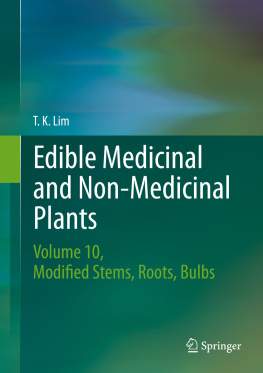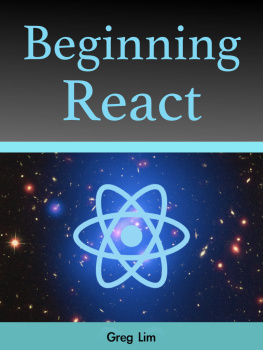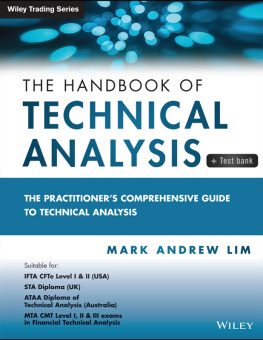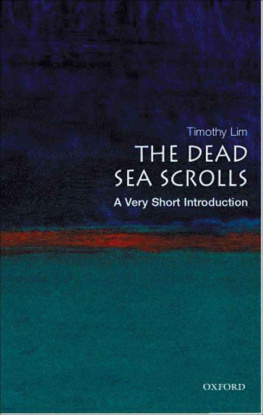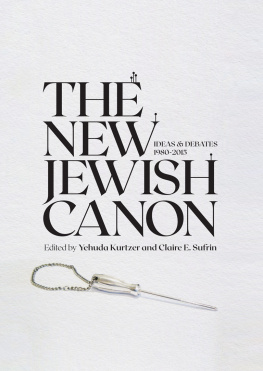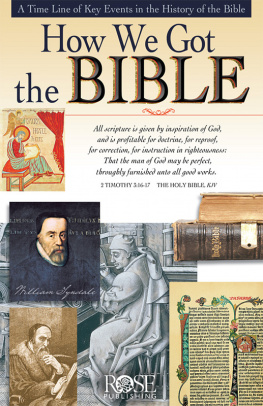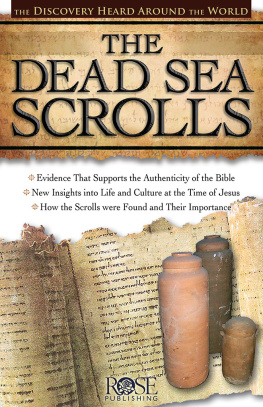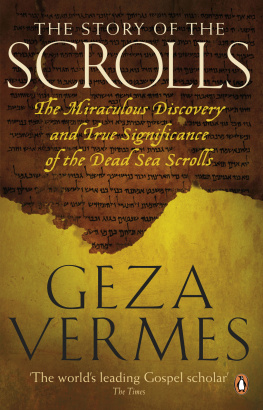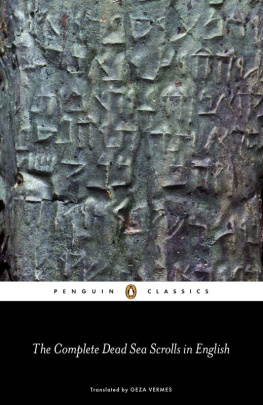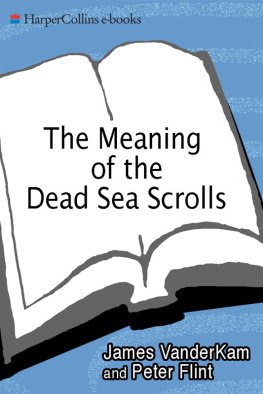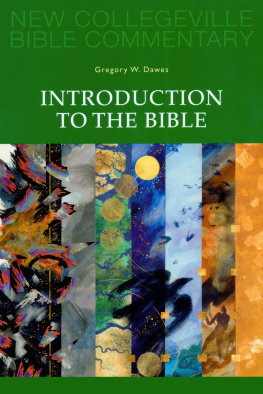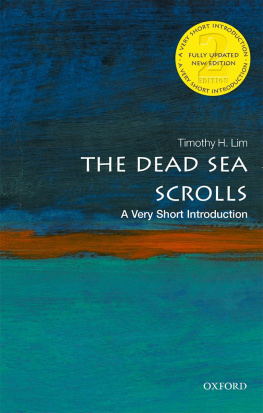The Formation of the Jewish Canon
The Anchor Yale Bible Reference Library is a project of international and interfaith scope in which Protestant, Catholic, and Jewish scholars from many countries contribute individual volumes. The project is not sponsored by any ecclesiastical organization and is not intended to reflect any particular theological doctrine.
The series is committed to producing volumes in the tradition established half a century ago by the founders of the Anchor Bible, William Foxwell Albright and David Noel Freedman. It aims to present the best contemporary scholarship in a way that is accessible not only to scholars but also to the educated nonspecialist. It is committed to work of sound philological and historical scholarship, supplemented by insight from modern methods, such as sociological and literary criticism.
John J. Collins
General Editor
THE ANCHOR YALE BIBLE REFERENCE LIBRARY
TIMOTHY H. LIM
The Formation of the Jewish Canon

Anchor Yale Bible and the Anchor Yale logo are registered trademarks of Yale University.
Published with assistance from the Mary Cady Tew Memorial Fund.
Copyright 2013 by Yale University.
All rights reserved.
This book may not be reproduced, in whole or in part, including illustrations, in any form (beyond that copying permitted by Sections 107 and 108 of the U.S. Copyright Law and except by reviewers for the public press), without written permission from the publishers.
Yale University Press books may be purchased in quantity for educational, business, or promotional use. For information, please e-mail sales.press@yale. edu (U.S. office) or sales@yaleup.co.uk (U.K. office).
Set in Sabon type by Integrated Publishing Solutions, Grand Rapids, Michigan. Printed in the United States of America.
Library of Congress Cataloging-in-Publication Data
Lim, Timothy H.
The formation of the Jewish canon / Timothy H. Lim.
pages cm. (The Anchor Yale Bible reference library)
Includes bibliographical references and index.
ISBN 978-0-300-16434-3 (cloth : alk. paper) 1. Bible. Old Testament Canon. 2. Bible. Old TestamentHistory. 3. Canon (Literature)History.
4. Bible. Old TestamentCriticism, interpretation, etc. I. Title.
BS1135.L56 2013
221.12dc23
2013014159
A catalogue record for this book is available from the British Library.
This paper meets the requirements of ANSI/NISO Z39.48-1992 (Permanence of Paper).
10 9 8 7 6 5 4 3 2 1
For my mother
Josephine Yu Lim (19262004)
IN MEMORIAM
Contents
Preface
In the Prologue to the Wisdom of Ben Sira the grandson wrote that while devoting himself to the translation and publication of his grandfathers book, he experienced , , a wakefulness caused by care and anxiety. The same thing happened to the epitomist of 2 Maccabees when he abridged Jason of Cyrenes history. I had never really experienced insomnia until I began to work on this book. Probably like most people, I had been restless some nights as I pondered a particular issue or problem. But I had not had a sustained period of sleeplessness until I began in earnest to produce the book that is before you. The writing of this book consumed me more than I had previously experienced or cared to admit.
My interest in the formation of the canon goes back a long way, ever since I investigated the textual characteristics of the scriptural citations in the letters of Paul and the sectarian commentaries of the Dead Sea Scrolls. Over the years I have continued to research and write on various topics, such as the praise of the fathers in Ben Sira, the canonical notice in 4QMMT, and the meaning of the defilement of the hands in the Mishnah. This long period of reflection was necessary given the scope of the subject and the burgeoning scholarly literature. There were numerous terminological and conceptual issues at stake, and they were, in turn, dependent on how key primary sources were interpreted. To compound the challenges, these sources were found within the fields of several subdisciplines that have as their research goals the study of the Pentateuch, Septuagint, Dead Sea Scrolls, writings of Philo, books of Josephus, Pauline letters, and Rabbinic literature.
I felt, however, that there was advantage in discussing the subject as a whole rather than piecemeal. Ever since the three-stage theory was demolished in the past generation, scholarly opinion has been divided and no consensus has emerged. Part of the reason may be found in the specialization of studies that tend to focus on narrower concerns and do not address the big picture. The emergence of the canon is a general issue that crosses disciplinary boundaries.
In this book, I have proposed a theory of the majority canon. First, I reviewed the scholarly literature in a preliminary way. Then I worked on each chapter. Finally, I drafted the conclusions and rewrote the first three chapters.
I have been fortunate to have aired some of my views beforehand in seminars and conferences. I have presented papers in the Biblical Studies seminars in Edinburgh, St. Andrews, and Kings College, London. I have spoken at the SNTS conference in Vienna, the BAJS conference in Southampton, a scrolls conference in Metz, and the Qumran section of the SBL International Meeting in London. I thank all the organizers of these seminars and conferences for the invitations. Several colleagues have also read and responded to drafts of my chapters or engaged me in discussion.
In particular, I would like to thank the following: Edward Adams, Philip Alexander, Graeme Auld, Hans Barstad, Markus Bockmuehl, Juan Carlos Ossandn, Sidnie Crawford, James Davila, Karl Donfried, Steven Fraade, Jrg Frey, Florentino Garca Martnez, Martin Goodman, Larry Hurtado, Sarah Pearce, Tessa Rajak, David Reimer, Jean-Sbastien Rey, Raija Sollamo, Loren Stuckenbruck, Joan Taylor, William Tooman, Kristin de Troyer, and Cecilia Wassen. Alison Salvesen read the chapter on the Letter of Aristeas and gave me very useful suggestions. James Charlesworth sent me a copy of his soon-to-be-published article on Deut 27:4. Lee McDonald sent me his publications on the canon and offered valuable feedback on the book. I spent a memorable few hours of conversation with Menahem Kister in France discussing the concept of canon. I also thank the anonymous readers for taking the time to respond to the proposal and draft manuscript during the review process.
I owe the greatest debt of gratitude to two colleagues, John Barton and John Collins. The former read probably half of the chapters and encouraged me to pursue a topic for which he is a leading expert. Johns gentle words were often disarmingly profound in their criticism. John Collins not only invited me to contribute to the series for which he serves as general editor, but he also took a great interest in the project, reading literally every word of the book, sometimes more than once! Johns well-known keen eye and sharp criticism saved me from numerous errors and helped hone the argument in a way that makes the book far better. What imperfections remain are naturally my own responsibility.
I would like to thank the editors at Yale University PressJennifer Banks, Margaret Otzel, Heather Gold, Susan Laity, and Bojana Ristichfor the courtesy, helpfulness, and excellent support throughout the process from its embryonic proposal to publication.
I dedicate this book in loving memory of my mother, who knew by heart virtually the whole of the Old and New Testament in Chinese.
Abbreviations
Next page

